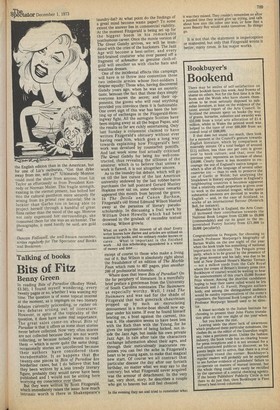Talking of books
Bits of Fitz
Benny Green
In reading Bits of Paradise (Bodley Head, 0.50), I found myself wondering, every twenty pages or so, whether I was wasting my time. The question is of some topical interest at the moment, as it impinges on two literary debates miriently proceeding, or rather on two debates arising out of literature. However, in spite of the topicality of the question, it does have some real importance. The great sales come-on about Bits of Paradise is that it offers us some short stories never before collected. Now very often stories are not collected because they are not worth collecting, or because nobody wants to read them which is never quite the same thing; occasionally stories are uncollected because their authors have considered them unredeemable. It so happens that ilhe twenty-one pieces in Bits of Paradise are borderline cases, but I do believe that had they been written by a, less trendy literary figure, probably they would never have been published and I would not be sitting here Worrying my conscience over them. But they were wiiftet—r by Scott Fitzgerald, which immediately raises the issue: how much intrinsic worth is there in Shakespeare's
laundry-list? At what point do the findings of a great mind become waste paper? To some extent the answer lies in commercial viability.
• At the moment Fitzgerald is being set up for the biggest boom in his remarkable posthumous career. Once the movie version of The Great Gatsby arrives, we will be inundated with the cries of the hucksters. The Jazz Age will become a best-seller, and every bird-brained couturier who ever passed off a fragment of schmutter as genuine cloth-ofgold will smother us with cloche hats and waistless dresses.
One of the incidental effects this campaign will have is to throw into contention those two imbecile armies whose foot-soldiers I despise equally: Those who, having discovered Gatsby years ago, when he was an esoteric taste, bemoan the fact that these days simply everyone knows the secret; and their opponents, the goons who will read anything provided you convince them it is fashionable. One overt sign of this war has been the hotting up of exchanges in the Fitzgerald-Hemingway fight. All the surrogate Scotties have been sniping away at all the bogus Papas, and the results so far are richly entertaining. Only last Sunday a columnist claimed to have written Fitzgerald's obituary without ever having read him, which goes a long way towards explaining how Fitzgerald's best work was devalued by counterfeit pontiffs. And last week some fool actually criticised The Great Gatsby for being too well-constructed, thus revealing the silliness of the amateur, which is to believe that unless a work is flawed, it is not altogether sincere.
As to the laundry-list debate, which will go on till the last curate of the last American university endowed by the last robber-baron purchases the last postcard Gerard Manley Hopkins ever sat on, some relevant remarks appeared this month from beyond the grave. In The Devils and Canon Barham, Fitzgerald's old friend Edmund Wilson blasted away at the parasites of literary pseudoscholarship. In discussing a frail work by William Dean Howells which had been drowned in the goulash of recondite textual cooking, Wilson growls:
What on earth is the interest of all this? Every writer knows how diaries and articles are utilised as material for books, and no ordinary reader knows or cares ... What is important is the finished work ... All this scholarship squandered is a waste of money and time ...
except of course to those who make a living out of it. But Wilson is absolutely right about the fraudulence of an edition of The Marble Faun which runs to 467 pages, plus another 266 of professorial innuendo. .
Where does that leave Bits of Paradise? On the far periphery of literature. In a mercifully brief preface a gentleman from the University of South Carolina nominates The Swimmers as especially worthy. Well, I read The Swimmers and was sad for the shade of Fitzgerald that such gimcrack chauvinism propped up by such an excruciating denouement in a motor-boat should now appear under his name. If ever he found himself beating on, a boat against the current, this was it. His obsession seems to have been less with the Rich than with the Young, for he gives the impression of being locked, not inside the Jazz Age, but inside his own private Jazz Age. In tale after tale the characters exchange information about their ages, and through their meticulously inaccurate responses you can feel the ache in Fitzgerald's heart to be young again, to make that magical new start. Of course we all contract that particular disease the day after our fortieth birthday, no matter what we may say to the contrary; but what Fitzgerald never acquired was the armour of detachment. In the very last, very short, story, he describes a couple who get to heaven but still feel cheated:
In the evening they sat and tried to remember what it was they missed. They couldn't remember so Lifter a puzzled time they would give up trying, and talk about how nice the other one was, or how fine a score Beauty Boy would make tomorrow. So things go.
It is not that the statement is imperceptive or mannered, but only that Fitzgerald wrote it better, many times, in his major works.










































 Previous page
Previous page